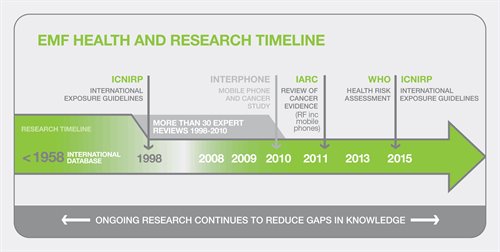Introduction to the World Health Organization
Overview
The World Health Organization (WHO) is the directing and coordinating authority for health within the United Nations system.
The WHO has responsibility for:
- providing leadership on global health matters;
- shaping the health research agenda;
- setting norms and standards;
- articulating evidence based policy options;
- providing technical support to countries; and
- monitoring and assessing health trends.
WHO EMF Project
Electromagnetic fields (EMF) of all frequencies represent one of the most common and fastest growing environmental influences. As part of its Charter to protect public health and in response to public concern, the WHO established the international EMF Project in 1996. The purpose of the EMF Project is to assess the scientific evidence of possible health effects of EMF in the frequency range from 0 to 300 GHz.
Refer to the EMF Project web site for additional information

Source: EMF Project
With respect to EMF there are a number of important groups that advise the WHO including the International Agency for Research on Cancer (IARC), and the International Commission for Non-Ionizing Radiation Protection (ICNIRP)
EMF Research Timeline
The EMF research timeline shows the major reviews and research projects leading up to the WHO Environmental Health Criteria where formal health risk assessments will be made on exposure to EMF.

Useful Links
WHO EMF Programme - http://www.who.int/emf
ICNIRP – http://www.icnirp.org/
IARC - http://www.iarc.fr/